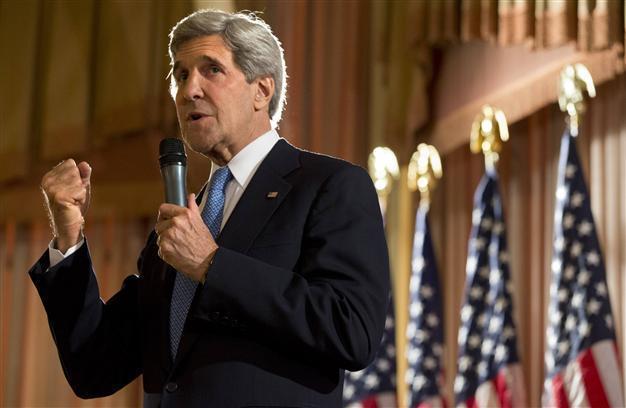Kerry presses 'possible, but difficult' Mideast peace
KUWAIT CITY - Agence France-Presse

U.S. Secretary of State John Kerry speaks to staff from the U.S. Embassy in Kuwait City June 26, 2013. REUTERS/
US Secretary of State John Kerry voiced confidence on Wednesday that Israeli and Palestinian leaders both wanted peace as he called for progress "as soon as we can" in moving towards talks.
On his fifth regional trip since taking office in February, Kerry heads to Jordan, from which he will shuttle between Israeli Prime Minister Benjamin Netanyahu and Palestinian president Mahmud Abbas.
"I wouldn't be here now if I didn't have a belief that this is possible. But it's difficult -- we all know how difficult," Kerry told reporters on a visit to Kuwait before flying out.
Amid doubts on whether the two sides can even sit down together for talks after a three-year gap, Kerry said Abbas and Netanyahu "have both been tested" but called them "very skilled veterans" of Middle East politics.
"I am quite confident in their serious commitment of purpose," Kerry said. "I believe they believe the peace process is bigger than any one day or one moment." Netanyahu, who already had a tense relationship with Barack Obama during the US president's first term over pressure on the peace process, came out of elections leading a coalition that is even more critical of compromises.
Netanyahu's own Likud party has just elected as its president Danny Danon, a deputy defence minister popular with the right wing who earlier this month said the ruling coalition would oppose any move towards a Palestinian state.
Coalition partner Naftali Bennett, who heads the far-right Jewish Home party, said the Palestinian issue was akin to "shrapnel in the buttocks" -- something that Israel simply had to live with.
Kerry steered clear of setting a deadline but said he hoped for progress "as soon as we can" -- especially before the annual UN General Assembly in September, when Abbas could seek to rally international support.
"Long before September, we need to be showing some kind of progress in some way because I don't think we have the luxury of that kind of time," Kerry said.
"The passage of time allows a vacuum to be filled by people who don't want things to happen," he said.
But Kerry said he wanted to avoid setting any timeframe for the two sides, saying: "Deadlines can become self-imposed hurdles, and in fact impediments, to actually making progress." Netanyahu said on Tuesday that his goal was not just to "tick the box of starting negotiations".
"Our aim is to persevere in the talks and to continue them for a period of time in order to try to deal with the issues and reach an agreement that will resolve the essential issues of the conflict." The two sides have not held face-to-face negotiations since September 2010. And those talks broke down within weeks after Israel failed to renew a freeze on construction of new homes for Jewish settlers in the West Bank.
The Palestinians demand that Israel halt all construction and accept the 1967 lines as the basis for negotiations, while Israel has hit back that it would only talk without such "pre-conditions".
On Wednesday, the Palestinian Authority reaffirmed its position on settlements and 1967 lines, dismissing as "misleading" Israeli media reports that Abbas would water down his stance under pressure from Kerry.
"The Palestinian leadership has supported Secretary Kerry's initiative and expressed, on several occasions, their confidence that Secretary Kerry's intentions are genuine," a statement said.
"Unfortunately, the Israeli government continues with policies on the ground that contradict and prejudice the very outcome of negotiations," it said.
Kerry was switching focus to the peace process after stops in Qatar and Saudi Arabia that looked mostly at coordinating assistance to Syrian rebels in the civil war against President Bashar al-Assad.
Making his first visit as secretary of state to Kuwait, he hoped to encourage further international initiatives by the oil-rich state, which a US-led coalition freed from Iraqi occupation in the 1990-91 Gulf War.
He thanked Kuwait for hosting an international conference in January that raised some $1.6 billion (1.2 billion euros) in humanitarian assistance for victims of the Syrian civil war.
